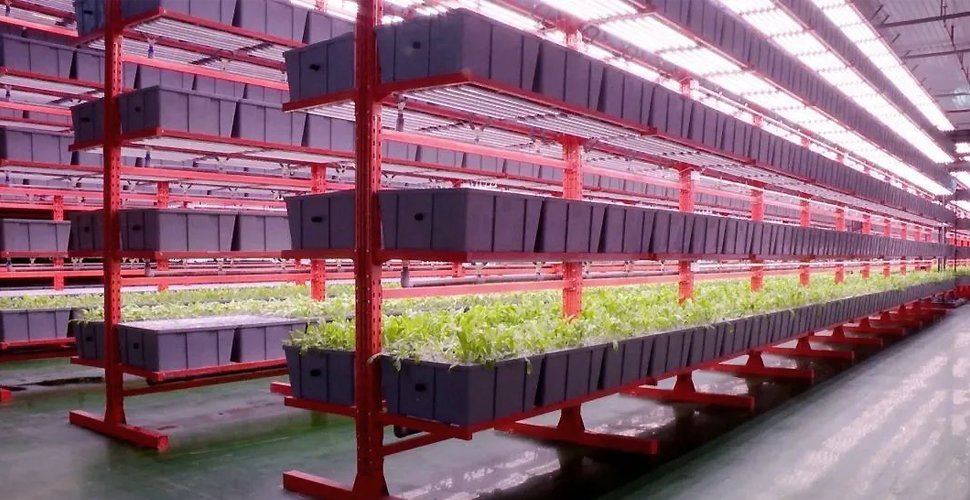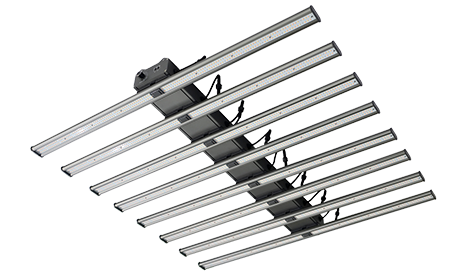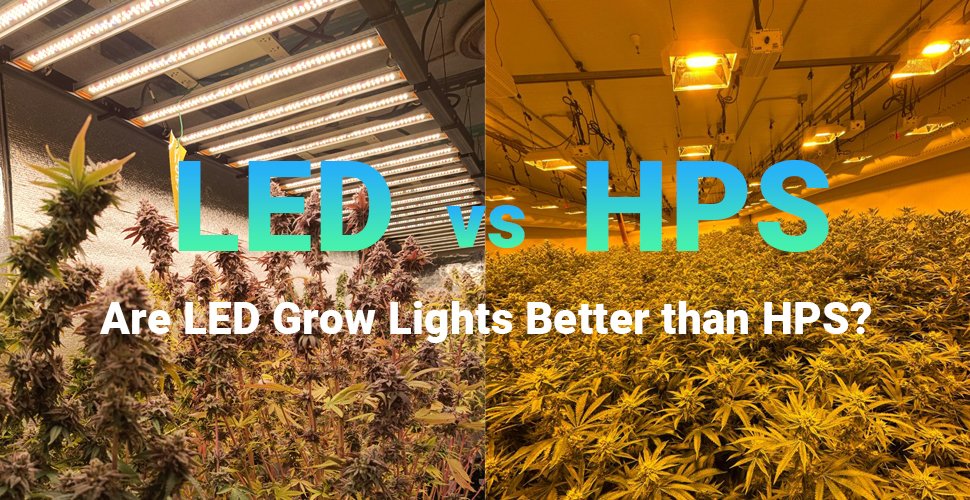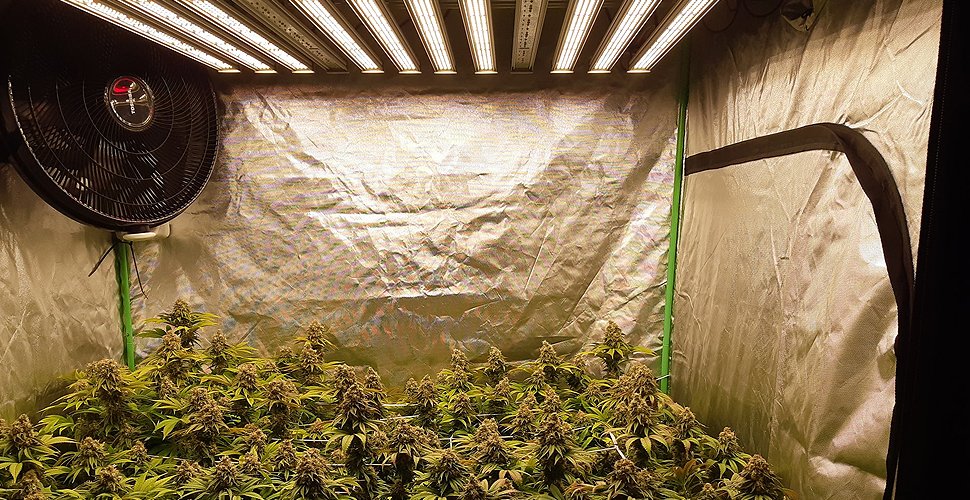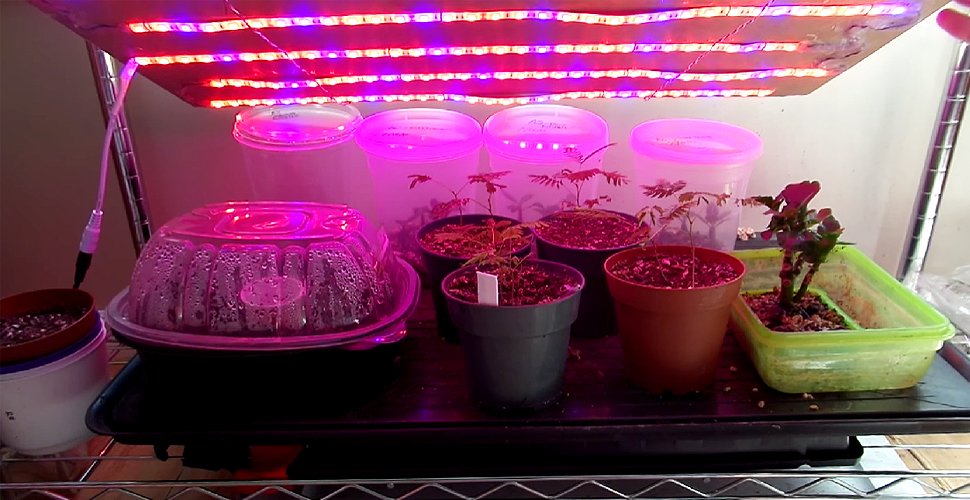V posledních letech vedly po sobě jdoucí vlny veder, sucha a záplavy k nestabilním klimatickým podmínkám na celém světě, což představuje výzvu pro rozvoj živočišného průmyslu.
Farmáři nemají jinou možnost, než kupovat drahé krmivo, seno a další obilí, aby svá zvířata uživili. To zhoršuje již tak napjatý potravní řetězec a může vést k vyšší inflaci, než je současná úroveň.
Nikdy nemůžeme předvídat, kdy udeří přírodní katastrofy, ale jsou některé věci, které můžeme ovlivnit: používání hydroponických technik a efektivní využívání omezených zdrojů v hydroponickém chovu krmiv.
Ziskovost chovu krmiv zůstává předmětem diskusí, především kvůli vysokým nákladům na energii a souvisejícím kapitálovým výdajům.
Stále větší počet společností v Číně, Spojených státech, na Středním východě a v dalších regionech se nyní zaměřuje hydroponické napájecí systémy.
Zde se podělím o případovou studii inteligentní továrny na píci v Tumxuk City, Xinjiang, Čína.
Krmivo vždy zelené ve všech ročních obdobích
Inteligentní továrna na krmivo stojí v průmyslovém parku na ulici Yong’anba, město Tumxuk, třetí divize Sin-ťiangu.
Plocha sázení této továrny na pícniny pokrývá přibližně 6 000 metrů čtverečních a využívá pětipatrovou vertikální sázecí strukturu, která výrazně zvyšuje efektivitu sázení na jednotku plochy.
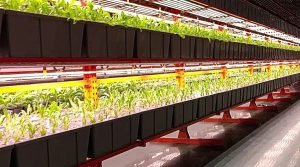
Ročně vyprodukuje cca 3000 tun čerstvé kvalitní píce s vysokým obsahem bílkovin (s obsahem bílkovin 32,2 %). Pokud jde o výnos bílkovin, odpovídá produkci přibližně 3 700 akrů pastvin v Číně.
Tato továrna využívá plně integrovaný model rostliny s inteligentními sazenicemi, fotobiologií, prostředím, půdou, vertikální kultivací, robotickou sklizní a systémy výroby krmiv.
Zajímavé je, že píce se zde daří v mlžné atmosféře, aniž by potřebovala vodu nebo půdu.
V oblasti sazenic dělníci čile sejí semena a už je vidět, že mnohá semena, která byla zaseta dříve, prolamují skořápky a klíčí. Malý výběh dokáže vychovat až 80 000 sazenic píce najednou.
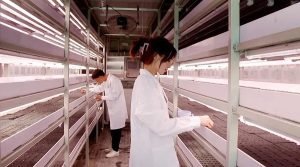
Po 15 až 20 dnech růstu jsou tyto sazenice připraveny k přesazení do vertikální ekologické pěstební zóny pro plně automatizovanou výživu.
Farmář přizpůsobuje požadavky na absorpci živin pro různé typy a fáze růstu píce. Přeměňují potřebné živiny pro píci do formy nanomlhy, přičemž přesně kontrolují různé ukazatele, jako je obsah vody a hladina kyslíku. Tento přístup dosahuje pozoruhodné míry úspory vody 95 %.
Vstup do pěstební oblasti, pod jasné LED růstové osvětleníŘádky kvetoucí píce na pětipatrových vertikálních sázecích regálech upoutají vaši pozornost.
Uvnitř kultivační plochy monitorují různé senzory data v reálném čase, včetně teploty, vlhkosti, intenzity světla, koncentrace CO2 a dalších.
 Přes skleněnou stěnu pěstebního prostoru můžete vidět velkou platformu pro správu řízenou daty pokrývající celou stěnu, která slouží jako mozek chytré továrny na píci. Neustále zobrazuje data v reálném čase pro všechny aspekty provozu továrny.
Přes skleněnou stěnu pěstebního prostoru můžete vidět velkou platformu pro správu řízenou daty pokrývající celou stěnu, která slouží jako mozek chytré továrny na píci. Neustále zobrazuje data v reálném čase pro všechny aspekty provozu továrny.
Tato platforma je zodpovědná za příjem a zpracování dat o růstu rostlin nahraných vertikálním ekologickým kultivačním systémem, digitálním půdním systémem, fotobiologickým systémem, systémem kontroly prostředí plodin a robotickým systémem.
Ukládá a poskytuje v reálném čase přístup ke všem datům generovaným v továrně na píci.
Sklizeň ječmene trvá 7 dní
Tým Auxgrow také dokončil výstavbu krytého krmného farmy v oblasti Aksu v Xinjiang v Číně. Integrovali jsme se zemědělský IoT pro automatizovanou správua tím dosáhnout vysoké účinnosti a produktivity.
Od namáčení semen až po výsadbu je celý proces výroby automatizovaný. Po namočení v oblasti namáčení semen jsou semena transportována přímo na místo výsadby pomocí dopravního pásu.
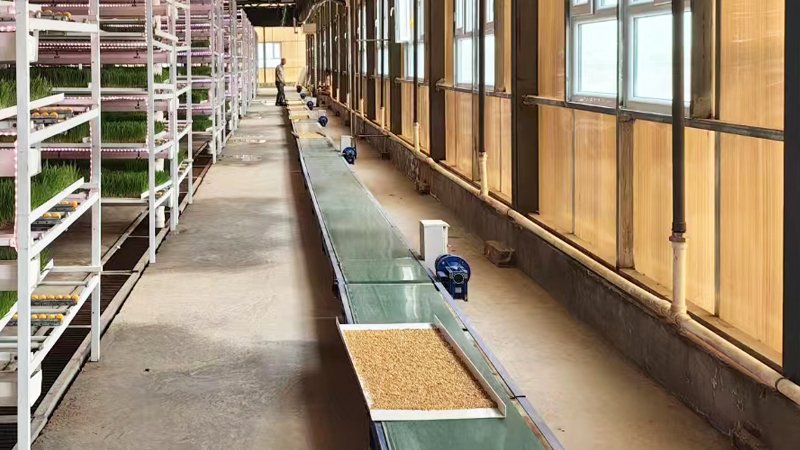
Každá úroveň sázecí skříně je vybavena kladkovými zařízeními, díky nimž je proces sklizně a výsadby efektivnější a pohodlnější.
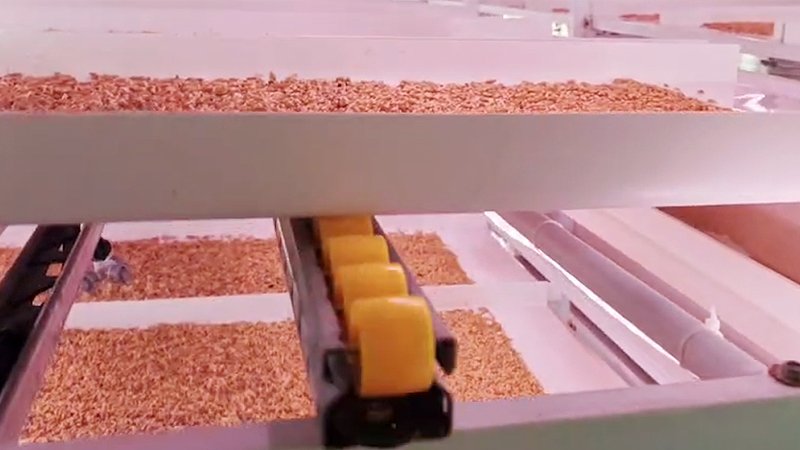
Jednostranná otevřená konstrukce s drenážním kanálem na dně zajišťuje efektivní odvodnění a zabraňuje případnému hnilobě semen nebo píce.
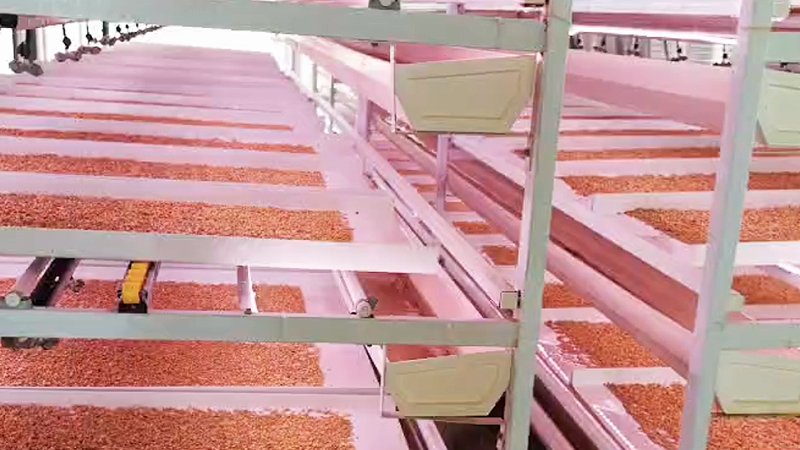
Využitím efektivní víceúrovňové vertikální metody výsadby se výnos na jednotku plochy zdvojnásobil, což účinně řeší problém nedostatečné píce pro hospodářská zvířata a drůbež.
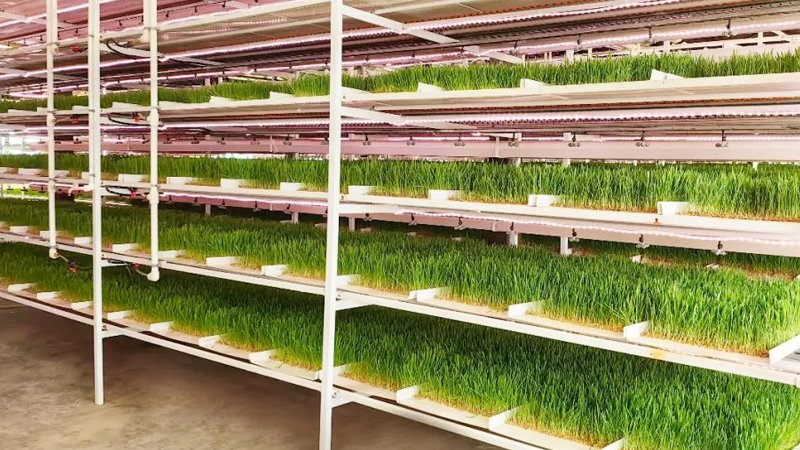
Několik postřikovacích trysek v každé vrstvě automaticky zavlažuje, aby byla píce trvale vlhká pro zdravý růst.
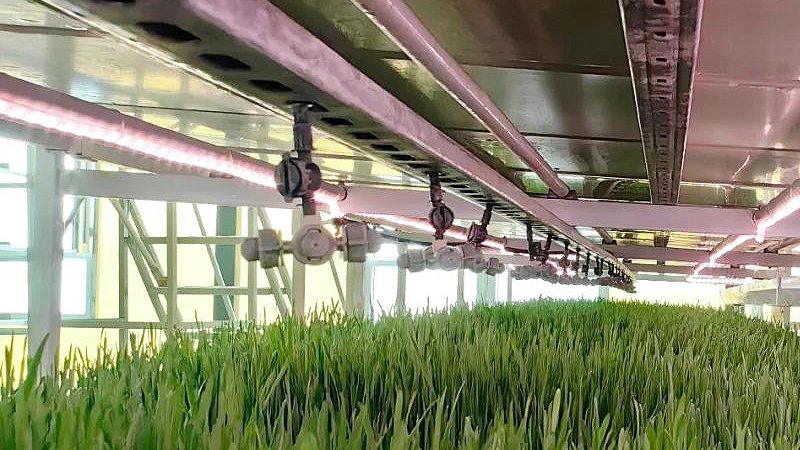
Systém osvětlení pro správnou fotosyntézu zahrnuje dvě sady doplňkových rostlinných světel na každé úrovni.
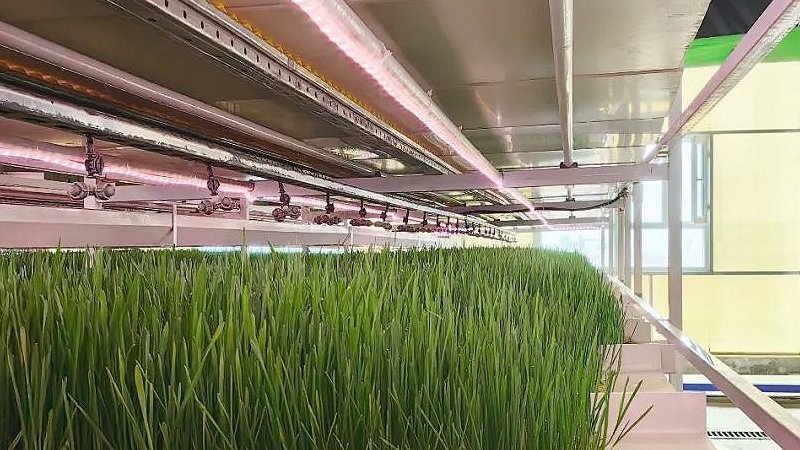
Tento vertikální hydroponický systém v továrně poskytuje vysoce kvalitní plodiny s kratším růstovým cyklem.
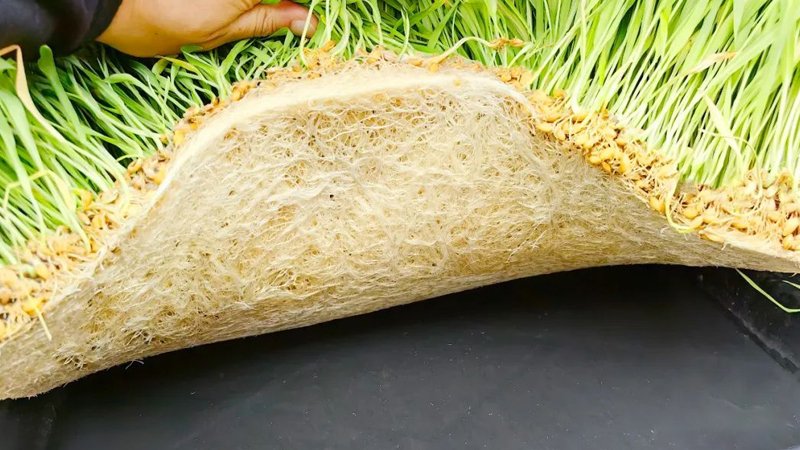
Kontaktujte Auxgrow ještě dnes
Výstavba chytré továrny na píci představuje významný krok ke globálnímu přechodu od tradičního zemědělství k digitálnímu zemědělství, optimalizující růstové prostředí pro pícniny na nejvyšší míru.
Konstrukční model továrny na pícniny můžete určit na základě vašich konkrétních okolností.
- Pokud máte dostatek místa, můžete si postavit velký skleník.
- I při omezeném prostoru může flexibilní továrna na výrobu kontejnerů přinést značné plodiny.
Pokud byste se chtěli dozvědět více o hydroponickém chovu krmiv, neváhejte nás kontaktovat. Rádi vám poskytneme další informace a další příklady k předvedení jeho výhod.
Jayes
Jako digitální marketingový manažer ve společnosti AUXGROW spojuje Jayes vášeň pro hydroponické systémy a odborné znalosti v oblasti LED pěstebních světel. Díky praktickým zkušenostem a hlubokému porozumění vás Jayes provede světem udržitelného pěstování.

